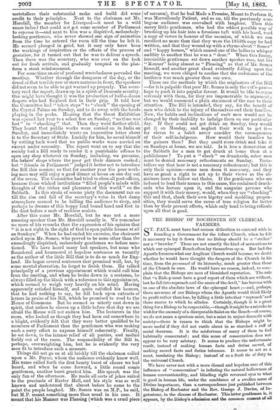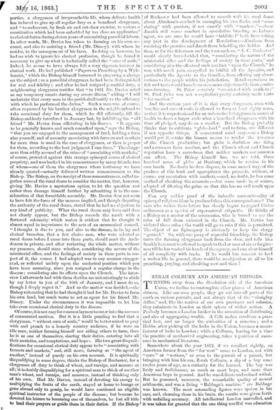THE BISHOP OF ROCHESTER ON CLERICAL FARMERS.
ST. PAUL must have had serious difficulties to contend with in founding a Government for the infant Church, when he felt it necessary to lay it down that no Bishop should be a "striker" nor a "brawler." These are not exactly the kind of accusations to- which our episcopal Bench often lay themselves open. But had the- Apostle foreseen what our Anglican Church would become, we doubt whether he would have thought the dangers of the Church in his time, from the personnel of its hierarchy, much greater than those of the Church in ours. He would have no reason, indeed, to com- plain that the Bishops are men of blemished reputation. The rule that "a Bishop must have a good report of them which are without, lest he fall into reproach and the snare of the devil," has become with us one of the absolute laws of the episcopal heart ;—aud, perhaps; there are some of our Bishops whom the Apostle would think likely to profit rather than lose, by falling a little into that " reproach" and those snares to which he alludes. Certainly, though it is a great thing for a Bishop to be respectable,—though it mightbe a mistake to wishfor the anomaly of a disreputable Saint on the Bench—of course, we do not mean a spurious saint, but a saint in unjust discredit with- society—there is reason to think that the Bishops might be- more useful if they did not rustle about in so starched o. ruff of social decorum. It is the misfortune of many of them to feel habitually consecrated ; and this sense of consecration does not- appear to be very salutary. It seems to produce the unfortunate result, instead of making human facts and duties sacred, of making sacred facts and duties inhuman. It seems to act as a moat, insulating the Bishop ; instead of as a fresh tie of duty to
universal Church.
We have never met with a more dismal and hopeless case of this influence of "consecration" in inflating the natural hollowness of human conventionality, and blinding right reverend eyes to what. is good in human life, under the semblance of a swollen sense of Divine importance, than a correspondence just published between the Bishop of Rochester and the Rev. George 3. Davies, of In- gatestone, in the diocese of Rochester. This latter gentleman is, it appears, by the Bishop's admission and the common consent of all patties, a clergyman of irreproachable life, whom delicate health has induced to give up all regular duty as a beneficed clergyman, and "to endeavour, by fresh air and out-door exercise, to restore a constitution which had been enfeebled by too close an application" to cleriealduties during eleven years of unremitting parochial labour. In other words, Mr. Davies has taken to farming on his own ac- count, and also to assisting a friend (Mr. Disney), with whom he resides, in the management of his farm. In doing so, however, he had no wish to ignore his clerical profession, though he found it necessary to give up what is technically called the "cure of souls." Indeed, ha seems to have always felt a very vigorous interest in clerical work. He had published "Papers on Preaching by a Wyk- hamist," which the Bishop himself borrowed in preparing a charge on the subject ; as a parochial clergyman he had been distinguished for zeal and fidelity ; and after he had resigned perochial duty, a neighbouring clergyman testifies that "in 1861 Mr. Davies acted as my temporary curate during my severe illness," adding "I will undertake that every man in the parish shall testify to the efficiency with which he performed the duties." Such a man was, of course, often requested by his brother clergymen in the neighbourhood to take occasional duty for them, which he did efficiently, till the Bishop suddenly interfered in January last, by inhibiting his "old friend" Mr. Davies from officiating in his diocese. "It appears to be generally known and much remarked upon," says the Bishop, "that you are engaged in the management of land, holding a farm also yourself, and of necessity associating with farmers and markets far more than is usual in the case of clergymen, or than is proper for them, according to the best judgment I can form." The clergy- man thus oddly accused of the crime of "associating with markets," of course, protested against this strange episcopal canon of clerical propriety, and was backed in his remonstrance by many friends, two of whom—one of them the clergyman whose testimony we have already quoted—actually delivered written remonstrances to the Bishop. The Bishop, on the receipt of these remonstrances, called to- gether some of the rural deans to consider the matter, first, however, giving Mr. Davies a mysterious option to let the question rest rather than damage himself further by submitting it to the con- sideration of that formidable assembly. Mr. Davies does not seem to have felt the force of the menace implied, and though disputing the authority of the rural deans, stated that he had no objection to any kind of publicity. What the rural deans may have said does not clearly appear, but the Bishop records the result with a fluttered solemnity which makes it evident that he thought it almost equal in importance to the acts of an oecumenical council. "I thought it due to you, and also to the diocese, in its lay and clerical branches, that a few choice men, who were selected as rural deans before I came into these pasts, should meet the Arch- deacon in private, and after reviewing the whole matter, without my presence, should state whether, considering the nature of the ministerial office, and the feelings of society in these parts in res- pect of it, the course I had adopted was in any manner exagger- ated, or reflected unduly upon the unclerical position which you have been assuming, since you resigned a regular charge in the diocese ; considering also its effects upon the Church. The inter- view I afterwards had with them decides me unhesitatingly to abide by my letter to you of the 10th of January, and I must do so, though I deeply regret it." And so the matter was decided,—the Bishop reiterating that he had thought it bad for Mr. Davies to farm his own land, but much worse to act as agent for his friend Mr. Disney. Under the circumstances it was impossible to let him take even occasional clerical duty in the diocese.
Of course, itis not easyfor commonlaymento enter into the recesses of consecrated motives. But it is a little puzzling to find that a clergyman, "without cure of souls," would be better suited to pray with and preach to a homely country audience, if he were an idle man, neither farming himself nor aiding others to farm, than he is as one of themselves, sharing their duties, entering into all their anxieties, and temptations, and hope 3. His two great disquali- fications for occasional clerical duty appear to be "associating with farmers and markets," and, still more, farming as "the agent of another," instead of purely on his own account. It is spiritually "disqualifying in some degree, thinks the Bishop of Rochester, for a clergyman off duty to think of wheat, and turnips, and manure at all; it is doubly disqualifying for a spiritual man to think of another man's wheat, and turnips, and manures, instead of thinking only of his own. Had Mr. Davies, instead of devoting his energy to multiplying the fruits of the earth, stayed at home to lounge or gone abroad only to gossip, he would have continued an eligible spiritual instructor of the people of the diocese ; but because he devoted his leisure to becoming one of themselves, he lost all title to lead their prayers or guide them in their duties. If the Bishop of Rochester had been allowed to consult with his rural deans about Abraham's conduct in managing his own flocks, and "asso- ciating" with graziers, if not exactly with "markets,"—about Jacob's still worse conduct in speculative breeding as Laban's agent, we are sure he would have "inhibited" both from taking any part in the development of Revelation ;—Abraham from receiving the promise, and Jacob from beholding the ladder. And then, as for the fishermen and the tent-makers, "J. C. Rochester" would clearly have decided that, "considering the nature of the ministerial office and the feelings of society in these parts," and considering also the effects of such conduct "upon the Church," he was, with much pain, compelled to inhibit all time Apostles, and particularly the Apostle to the Gentiles, from offering any obser- vations to the people within his jurisdiction.- Retail operations in fish and tents would have been even more objectionable than gentle- man-farming. St. Peter certainly "associated with markets ;" St. Paul (who was not a capitalist) pretty certainly made tents "for another."
And the curious part of it is that every clergyman, even with benefice and cure of souls, is allowed to farm at least eighty acres, so that it is unprofessional for an unbeneficed clergyman in search of health to do on a larger scale what a beneficed clergyman with his time all pledged, may do on a smaller. But the Bishop probably thinks that to cultivate " glebeland " and to farm, are different if not opposite things. A consecrated mind may,—as a Bishop would pat it,—take the human means to render the revenues of the Church productive ; but glebe is doubtless one thing and a common farm another, and the Church wheat and Church vegetation have a sacredness that neither markets nor manures can affect. The Bishop himself has, we are told, three hundred acres of glebe at Danbury, which be retains in his own hands. No doubt he does dispose, in some sacred way, of the produce of this land, and appropriates the proceeds, without, of course, any association with markets,—and, no doubt, he has some method of checking the accounts ;--but some mode is, of course, adopted of filtering the gains so that this has no evil result upon the Church.
Can any sadder proof of the imbecile conventionality of episcopal religious ideas be produced than this correspondence ? The man who writes these letters has clearly begun to regard Divine ordinances as a species of supernatural etiquette. He thinks of a Bishop as a master of the ceremonies, who is bound to see the rules of full dress enforced in the Church. Mr. Davies has violated these rules ; the world will go to ruin if this is permitted. The object of an Episcopacy is obviously to keep the clergy genteel." So, with one pang of regretful friendship, the Bishop turns the farming clergyman back from the door, and tells him frankly he cannot be allowed to speak to God or man of sin or forgive- ness till he has washed his hands of the agency, and can clear himself of all complicity with trade. If he would but consent to lead a useless life in general, there would be no objection at all to his preaching, praying, and absolving now and then !































 Previous page
Previous page